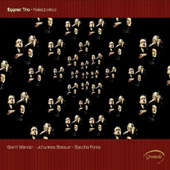
COLLECTIONS

Gerrit Wunder - Sequentia Miraculi
Johannes Berauer - Piano Trio No. 1
Sascha Peres - 7 Präludien mit Prolog und Epilog
Pieces for Piano Trio all written within the last five years, by composers all born during the 1970s, and all upon request by the Eggner Trio in search of
new music to perform. And this is where the similarities come to an end.
The CD opens with a flash of colour and energy, with a four-movement work titled Sequentia Miraculi by composer Gerrit Wunder
(b 1978). Although it does at certain moments display a deeply melodic and lyrical quality, it is mostly characterized by a nervous, almost mechanical energy that conjures
up animated imagery, and immediately brings to mind the music of film-music composer Danny Elfman who wrote the theme for the animated TV series "The Simpsons". So
imagine my pleasant surprise while reading the booklet notes following my initial listen, to find out that he does in fact write and produce music for European and American
films and TV stations. His writing skills, in this particular case for a small ensemble, create a force larger than the sum of its parts. There's a constant underlying momentum,
that somewhat like film music, is determined to keep the action moving along. The members of the Eggner Trio jump right in, with agitation and trepidation, as if providing the live soundtrack
to a silent movie.
One of my favorite moments on this recording happens to be the second movement of the Piano Trio No. 1 by Johannes Berauer
(b 1979). His writing has a way of infusing the music with a profound emotion, very much like the music of Mieczyslaw Weinberg. Other segments of this trio display a rich
palette of intricate writing which demands that high levels of emotional expression mesh perfectly with technical precision, something the members of the Eggner Trio accomplish
very well.
On the other hand, the 7 Präludien mit Prolog und Epilog by Sascha Peres (b 1973), comes very close at times to
crossing over into jazz, and even mainstream pop territory. But in keeping with the other works on this CD, one of its movements comes close to reproducing a cinematic
experience by emulating the music of composer Bernard Herrmann during his Hitchcock days. The otherwise lyrical and flowing quality of this music displays how well the
Eggner brothers work together as one unit made of three individual parts. Oddly enough, the final Epilog, written for solo piano, is beautiful in its simplicity,
and is wonderfully played here by Christoph Eggner. It's the kind of piece that drifts through your mind long after its audition.
From start to finish it is clearly obvious that this project was a collaboration between composers and performers that share the same aspirations, and that everyone involved
had taken ownership of the material to assure its première recording was an unqualified success. A recording that shows beyond a shadow of a doubt that today's chamber
music is alive and well.
Jean-Yves Duperron - November 2011